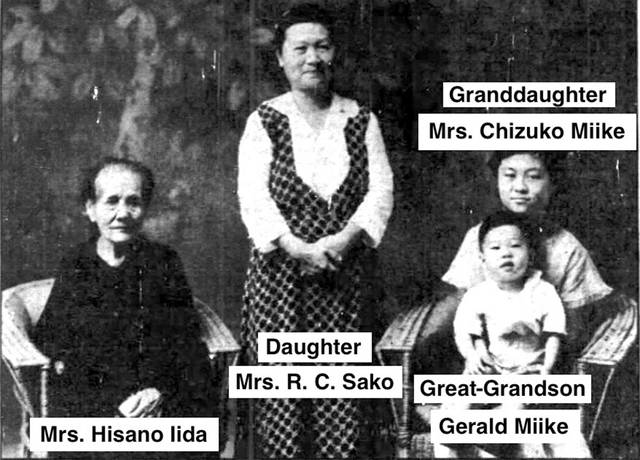The first child born in Hawaii to Japanese parents began life on Maui in 1868 as the offspring of Haru and Moshichi, members of the initial group of Japanese contract laborers, 153 in number, that had immigrated to Hawaii in that year, but the family returned to Japan, leaving behind no progeny.
The first child born in Hawaii to Japanese parents began life on Maui in 1868 as the offspring of Haru and Moshichi, members of the initial group of Japanese contract laborers, 153 in number, that had immigrated to Hawaii in that year, but the family returned to Japan, leaving behind no progeny.
Several years later, on Feb. 9, 1885, the very day Japanese immigrant Mrs. Hisano Iida (1855-1940) arrived in Honolulu from Japan with her husband and two sons, in the vanguard of the second wave of emigration from Japan, she was rushed to a hospital, where she gave birth to a daughter.
When Queen Kapiolani was thereafter mistakenly informed that Mrs. Iida’s child was the first baby of Japanese parentage born in Hawaii, she sent her sister-in-law, Princess Liliuokalani, and a lady in waiting to greet the newborn child.
Princess Liliuokalani — crowned Queen Liliuokalani in 1891 — was also apparently unaware of the birth of Haru’s and Moshichi’s child, but nevertheless presented Mrs. Iida with gifts of a christening robe and a layette, and was so intrigued with the baby that she asked the Iida’s to name the child after her, which they did, naming her Lydia.
Liliuokalani became the infant’s godmother as well, but when she sought to adopt the baby and warned Mrs. Iida that it might die if it were taken to a sugar plantation, Mrs. Iida, unwilling to part with it, politely declined.
The Iidas then sailed to Kauai, where Mr. Iida had been placed as a contract laborer at Kilauea Sugar Plantation, and where Liliuokalani’s prophetic warning sadly came true six months later when their baby died.
Mr. and Mrs. Iida, besides their two sons born in Japan, had two daughters born at Kilauea, and Mrs. Iida had 14 grandchildren and 13 great-grandchildren when she died at Eleele, Kauai, in 1940.
Another unusual fact about the Iidas is that they came to Hawaii as Roman Catholics, whereas their fellow Japanese immigrants commonly practiced Shinto or Buddhism.


